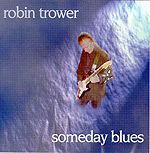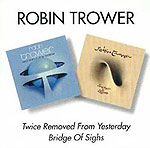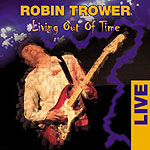
|
|||
|
|||
| Home |
| Gallery |
| Culture/ Technology |
| Fiction |
| Music |
| Poetry |
| Theater |
| What's New |
| About/Contact |
| Archive |
|
Trower switches gears, finds joy in the blues Published July 2006
Not that playing the blues is shocking, but it is a significant stylistic change for the former Procol Harum guitarist, who in the 1970s perfected the power trio concept that Jeff Beck originated and Rush cashed in on. His albums under his own name from that period attained a near-cult status among hard rock fans and guitar freaks. Fans of his classic 1970s albums like "For Earth Below," "Caravan to Midnight," "Long Misty Days," "Bridge of Sighs" and "Victims of the Fury" may find the material on "Someday Blues" a bit of a jump. So, Robin, why no pure blues before? "Cowardice, to be honest," Trower said, laughing, during an interview from his home in England. "I was frightened of it. To even get into that area, you're talking about some of the best music ever made. Obviously, you're opening yourself up to be compared, which is pretty scary." While Trower spent years being compared to Jimi Hendrix ("which is fair enough; he was a big influence"), he says that growing up in Essex, England, it was American blues that first turned him onto music. "From the age of about 16, 17, I started to hear my first stuff from America ... I was very lucky when I was growing up; I knew people who used to import records from America early on. B.B. King's 'Three O'Clock Blues' being the first thing like that I heard. Muddy Waters. Howlin' Wolf." By the time he started playing professionally, "I was already very influenced by guitarists like B.B. King and Muddy Waters and T-Bone Walker and all those guys." Not only is his new album his first all-blues recording, but it's also the first time in 25 years that Trower as sung on a record (the last time being two cuts on Procol Harum's "Broken Barricades.") So, Robin, why no singing before? "I guess it was just sort of a lack of confidence of laziness. Also, having to sing and play at the same time is enough to put you off." Although he hadn't sung on his own albums before – having had bassists Jack Bruce and James Dewar do so – Trower said he wasn't nervous once he made the decision to handle his own vocals. "I started off making demos, just to see if it would work, to see if anybody was completely turned off. Once we got past that, I started to get into it and really enjoy it." Trower said he really enjoyed the combination of playing the blues and singing – so much so he's leaning toward sticking with the combo for awhile. "In the back of my mind, I'd like to do another blues album because I think I could go in deeper." Trower also said that, at age 52, he finds himself more comfortable playing the blues. "I must admit it seems a bit more grown-up doing blues only because there's a little bit more art. I'm not saying there's no art in what I've done earlier, or rock 'n' roll per se, it's just that in blues it's a bit more involved." |
Copyright © Turbula.net




